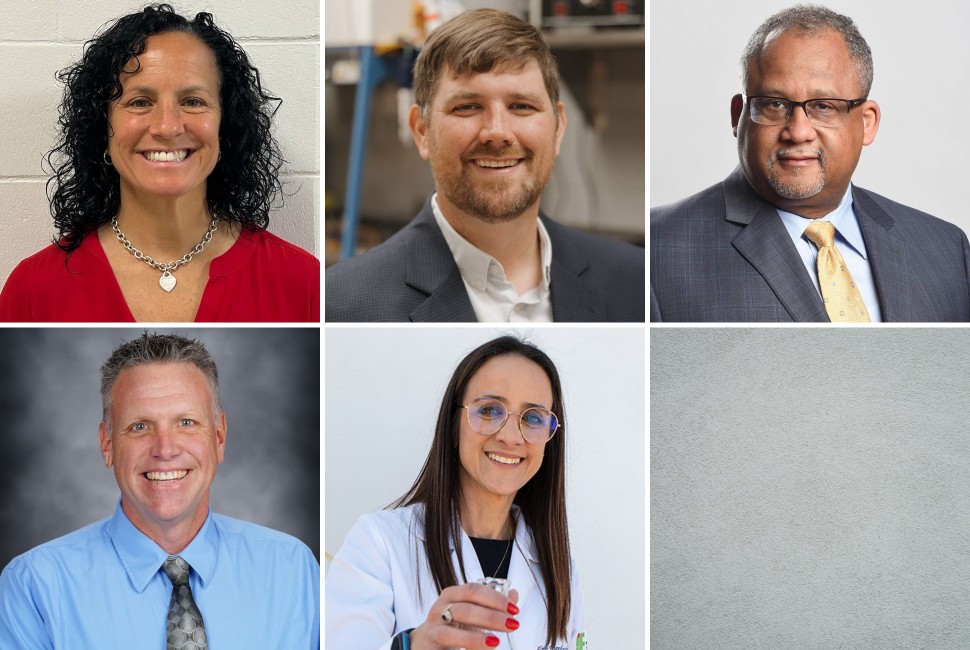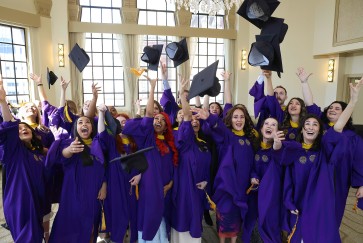The recipients of this year’s Morton Schapiro Distinguished Secondary School Teacher Award are five educators hailing from as close as Wisconsin to as far away as Brazil.
Given annually to five teachers based on nominations submitted by graduating Northwestern seniors, the Northwestern Schapiro Award honors excellent high school teachers from around the world for their professional and personal commitment to students. The awards carry a stipend of $5,000 for each teacher and $5,000 for each of their high schools.
The 2024 Schapiro Award recipients are Lauren Baugher, Ryne Emerick, Leon Grant, Shawn Gudmunsen and Flávia Twardowski. They will be honored during Northwestern’s 166th Commencement Ceremony on Sunday, June 9, with the award named for Morton Schapiro, the 16th president of Northwestern.
Sponsored by the Office of the President with cooperation from the School of Education and Social Policy (SESP) and supported by the Associated Student Government, the award recognizes the transformative power of teachers in our lives and communities.
To choose winners, a selection committee — comprising Northwestern faculty, staff and students and chaired by Rebekah Stathakis, curriculum and assessment coordinator and instructor, Master of Science in Education program, SESP — considers essays from graduating seniors about their former high school teachers. Nominated teachers also submit letters of recommendation and teaching portfolios, which explain their philosophies on education.
“This year’s honorees not only built the foundation for their students’ success at Northwestern but also did so during a pandemic that wreaked havoc on their transitions from high school to university life,” Northwestern President Michael Schill said. “It will give me great pleasure to celebrate these outstanding educators and the students they inspired during this year’s special commencement at the United Center.”
Lauren Baugher
Newton North High School, Newton, Massachusetts
Whether on the softball field or in the gym at Newton North High School in Massachusetts, Lauren Baugher strives to make her students feel safe and empowered.
“As a teacher, my goal is to make every student feel comfortable and that they are seen and heard,” Baugher said.
Anabel Marre, a senior in the Weinberg College of Arts and Sciences, said she began high school as a nervous freshman but Baugher immediately made her feel comfortable.
“Over the course of my four years at Newton North, Baugher’s guidance and mentorship was a constant and helped me grow into the empowered young woman I was at the end of high school,” Marre said.
Baugher teaches physical education, health and wellness. Beyond her role in the classroom, she engages with the Newton community through coaching various sports teams and creating youth sports programs. She believes in the proverb, “It takes a village to raise a child,” emphasizing the importance of collaboration among teachers, parents and the community to support student success.
Marre took advantage of a leadership opportunity when Baugher tapped her to coach a field hockey program for K-8 students. Coaching helped Marre gain not only leadership experience but confidence.
Baugher has been a leader in anti-racism efforts within her school, promoting equity in education by devising an anti-bias grading policy and becoming a mentor trained in combatting stereotype threat. Baugher's commitment to creating a safe and inclusive environment is unwavering, as she actively listens to her students’ concerns and advocates on their behalf, Marre said.
“Baugher worked tirelessly to make sure every student at Newton North had a comprehensive understanding of their own health and wellness and felt comfortable and safe in their own identity,” Marre said.
Ryne Emerick
Lebanon High School, Lebanon, Missouri
Emily Lester, now a senior in the School of Education and Social Policy (SESP), remembers asking her high school science teacher Ryne Emerick why he transformed study hall once a week into “Waffle Wednesday.” Emerick said that he knew the camaraderie of making and enjoying waffles together would pay off and that students would be more comfortable having conversations about science and asking tough questions.
Lester took many of Emerick’s values and lessons with her to Northwestern.
“Mr. Emerick’s teaching untraditional ways of learning and creating the conditions to learn from failure has impacted how I view my college experience and my work throughout SESP.”
Seeking ways to create community and elevate learning, Emerick transformed an underused computer lab at the rural Lebanon High School in Missouri into research laboratory space. The new science research program would become a pathway for students at all levels of science education to explore their own research questions.
When he read about students at a neighboring, wealthier school district participating in science competitions, Emerick asked, “Why not our kids too?” He worked with professionals in the private sector, professors and lab scientists to design a program supporting students with limited resources. The class began with just six students entering state competitions and eventually resulted in students placing at international competitions and regularly communicating with professors and other experts in their fields.
“Creativity is the heart of our program at Lebanon High School in that it provides students with the opportunity to drive their scientific research projects and create unconventional pathways for students,” Emerick said. “By empowering our students to take ownership of their research, they develop skills such as critical thinking, problem-solving and communication.”
As she approaches graduation at Northwestern, Lester fondly remembers “Waffle Wednesdays” and the opportunities Emerick provided to learn in untraditional ways.
Leon Grant
Marietta High School, Marietta, Georgia
Leon Grant, an engineering and technology teacher at Marietta High School in Georgia, is tireless in his pursuit of new learning opportunities for his students, which is why he says that “teaching is like being a guide on an exciting expedition.”
Marcos Rios, a senior at the McCormick School of Engineering, said that Grant taught him to design with the goal of solving problems with a community, instead of for a community.
“I’m thankful every day for the way that he taught me to approach problems, and I’m grateful I can still lean on him for advice,” Rios said.
Project-based learning, Grant said, leads students to confront challenges that call upon their creativity. Grant invites students to present with him at conferences, organizes Saturday family trips to the Atlanta Science EXPO, and connects students to summer STEM internships and apprenticeships. He engages industry professionals as mentors and schedules guest speakers from institutions such as Lockheed Martin and Georgia Tech Research Institute, exposing students to the real-world applications of engineering.
Grant understands that for his students to embrace such opportunities, he must embrace and acknowledge his students’ diversity, making lessons accessible across cultural differences. He helps students take advantage of available resources and takes his classes to meet with college counseling, career counseling, and social and emotional support staff at their student life center.
For Grant, one of the most rewarding parts of teaching is seeing his students participating at the highest levels at engineering and technology competitions, and another is each time an alum returns to mentor younger students.
“I feel that same responsibility to pass that on to future engineers,” Rios said. “I will always be thankful for him.”
Shawn Gudmunsen
St. Croix Falls High School, St. Croix Falls, Wisconsin
Shawn Gudmunsen of St. Croix Falls, Wisconsin, believes in the power of music education and its ability to improve his students’ lives.
Andrew Opel, now a senior at McCormick, was one of those students. He remembers his first-ever theatrical production. He landed the main role in his high school musical and was incredibly nervous. Before hitting the stage, Gudmunsen reassured Opel, giving him the added confidence he needed. “He connected with me and made me feel seen and worthy,” Opel said. “You’d better believe I nailed the performance after that.”
Gudmunsen has transformed the music program at St. Croix Falls High School by drawing in a record number of students, creating a new fine arts center and introducing mental health research into the music curriculum. Studying the benefits of music on mental health led Gudmunsen to use music as a “means to help students understand their own mental health and become more aware of how to help themselves,” he said.
For Opel, Gudmunsen was more than a teacher — he was a role model. He credits his former teacher for instilling a love for music that will always be a part of his life.
“It is in this way that he interacts with all his students — a deep connection conveying not only a passion for music, but also for their health and well-being,” Opel said.
Gudmunsen is also seen as a leader in the community, championing initiatives including a collaboration with Hope North, a school in Uganda that supports children — through music and dance — who are victims of human trafficking. He has been recognized with prestigious awards such as the Kohl Fellowship and the Wisconsin School Music Association’s Teacher of the Year award that honor his exemplary contributions to music education, including his research-based curriculum, the Music and Mental Health Teacher Toolkit.
Flávia Twardowski
Federal Institution of Rio Grande do Sul – IFRS Campus Osório, Osório, Brazil
Flávia Twardowski teaches manufacturing and engineering at Federal Institution of Rio Grande do Sul in Osório, Brazil, and said that she is “driven by the desire to inspire a love for science that extends beyond the classroom.”
Juliana Estradioto, a senior at McCormick, said that Twardowski instilled in her a sense of resilience and determination that to this day drives her passion for research and education.
Estradioto has many fond memories of Twardowski as her teacher. She recalled Twardowski contacting area institutions to let them use their lab facilities to do science experiments and driving Estradioto to the labs in their state capital. Their weekend trips to collect samples were always aided by chimarrao (a yerba mate drink) and Brazilian cheese bread.
“She not only willingly dedicated extra time outside of her duties to provide additional guidance, but she was always happy to be there for us, her students,” Estradioto said.
When Twardowski became a teacher, she left her hometown of Porto Alegre, a state capital in southern Brazil, and moved to the coastal region of Osório where education levels were low. In her new home, she understood that in teaching science she could make school more appealing to her students. She started with project-based learning, charging students with finding an issue within their community and coming up with a solution.
“In this context, my role as a teacher stands out because students are transformed throughout this process,” Twardowski said. “I work with them to recognize that mistakes are important for knowledge construction and for developing effective solutions; it is an integral part of knowledge building.”
Recognizing the challenge of making school attractive to students, particularly in underserved communities, Twardowski leverages science as a means of engagement and empowerment. While her students take on real-world issues, Twardowski encourages her students to create, to learn and even to fail.
“I am confident that she will continue to inspire and shape the lives of future students, just as she has done for me,” Estradioto said.


